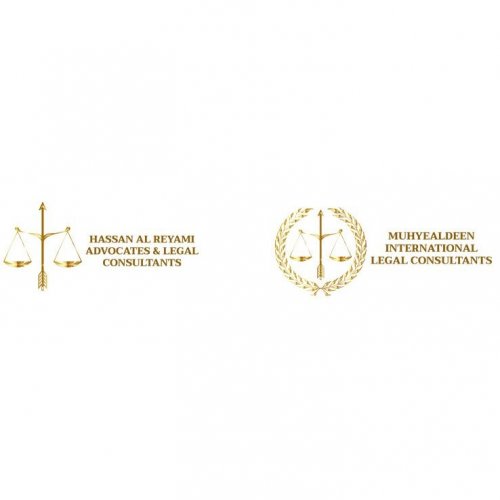Best Renewable & Alternative Energy Lawyers in Abu Dhabi
Share your needs with us, get contacted by law firms.
Free. Takes 2 min.
List of the best lawyers in Abu Dhabi, United Arab Emirates

The Black Robe For Legal Consultancy & Debit Collection
1 hour Free ConsultationAbout Renewable & Alternative Energy Law in Abu Dhabi, United Arab Emirates
Abu Dhabi, the capital of the United Arab Emirates (UAE), has positioned itself as a global leader in the development and adoption of renewable and alternative energy sources. The emirate has made ambitious commitments to diversify its energy sector, reduce its carbon footprint, and invest in sustainable technologies such as solar, wind, nuclear, and waste-to-energy projects. These efforts are supported by a comprehensive legal and regulatory framework established to encourage investment, ensure compliance, and support the long-term vision of a cleaner, greener future for Abu Dhabi.
Why You May Need a Lawyer
The field of renewable and alternative energy in Abu Dhabi operates within a complex matrix of local, federal, and international laws, as well as technical standards and contractual requirements. Individuals and businesses may encounter various situations where legal expertise is essential, such as:
- Setting up or investing in renewable energy projects
- Drafting and negotiating Power Purchase Agreements (PPAs) or supply contracts
- Obtaining the necessary permits and regulatory approvals
- Understanding land use and zoning regulations for energy installations
- Ensuring compliance with environmental and safety standards
- Resolving disputes with contractors or government authorities
- Navigating joint venture or public-private partnership arrangements
- Protecting intellectual property related to innovative technology
- Advising on carbon credits, incentives, and green certification
- Handling mergers, acquisitions, or restructuring of energy-related assets
Engaging a lawyer who specializes in renewable and alternative energy law can help you prevent costly mistakes, ensure regulatory compliance, and protect your interests in this rapidly evolving sector.
Local Laws Overview
Abu Dhabi's approach to renewable and alternative energy is shaped by a combination of federal UAE legislation and local Abu Dhabi policies. Key aspects of the legal landscape include:
- Regulatory Authorities: The Abu Dhabi Department of Energy (DoE) regulates the energy sector, including licensing and compliance, while the Emirates Water and Electricity Company (EWEC) oversees power supply and procurement.
- Independent Power Projects (IPPs): Abu Dhabi has embraced the IPP model, allowing private sector participation in energy generation, especially in large-scale solar and nuclear projects.
- Permitting and Licensing: All renewable energy activities require official licenses and permits, covering generation, connection, and sale of power to the grid.
- Environmental Approvals: Projects must comply with environmental laws and conduct Environmental Impact Assessments (EIAs) in accordance with the Environment Agency - Abu Dhabi (EAD) requirements.
- Power Purchase Agreements: Long-term agreements between energy producers and off-takers are governed by detailed legal and regulatory standards.
- Land Use and Zoning: Site selection for projects must adhere to land allocation and zoning policies, which can be complex for large installations.
- Incentives and Initiatives: Abu Dhabi offers incentives such as special investment zones and government-backed initiatives like Masdar City to stimulate sector growth.
- Renewable Energy Targets: The UAE Energy Strategy 2050 and Abu Dhabi's local plans set ambitious targets for renewable energy's share in the energy mix.
Given the technical and legal complexities involved, legal advice is highly recommended at all stages of renewable and alternative energy projects in Abu Dhabi.
Frequently Asked Questions
What types of renewable energy projects are common in Abu Dhabi?
Abu Dhabi is known for large-scale solar power plants, such as Noor Abu Dhabi and the Al Dhafra Solar Project, as well as investment in wind, waste-to-energy and nuclear energy (Barakah Nuclear Power Plant).
Who are the main regulators of renewable energy in Abu Dhabi?
The Abu Dhabi Department of Energy regulates energy policy, licensing, and compliance, while the Emirates Water and Electricity Company handles procurement and grid dispatch. The Environment Agency manages environmental approvals.
What permits are required to initiate a renewable energy project?
Developers must obtain various permits, including land use permissions, environmental approvals, construction permits, grid connection approvals, and licenses from the Department of Energy.
Can foreign investors participate in Abu Dhabi's renewable energy sector?
Yes, foreign investors can participate, often in partnership with local entities or through government-tendered projects under the Independent Power Project model.
Are Power Purchase Agreements legally enforceable?
Yes, PPAs in Abu Dhabi are legally binding contracts, typically involving the government or its agencies as off-takers, and are structured in accordance with local and international best practices.
What are the key challenges in developing renewable energy projects in Abu Dhabi?
Some challenges include navigating regulatory requirements, obtaining necessary permits, managing land allocation, and ensuring grid integration and financial viability.
Do renewable energy projects need Environmental Impact Assessments?
Yes, most projects require a comprehensive EIA to assess and mitigate potential environmental effects, as mandated by the Environment Agency - Abu Dhabi.
What incentives are available for renewable energy investments?
Incentives may include government-backed tenders, access to special economic zones (such as Masdar City), long-term PPAs, and support for research and development initiatives.
How can disputes in renewable energy projects be resolved?
Disputes may be resolved through negotiation, mediation, arbitration, or litigation, depending on the contract terms and nature of the issue. Choosing experienced legal counsel is critical.
What renewable energy targets has Abu Dhabi set?
Abu Dhabi and the UAE aim to achieve a significant share of energy from renewables, with the national Energy Strategy 2050 targeting 50 percent clean energy in the mix by 2050.
Additional Resources
For those seeking more information or support, the following organizations may be helpful:
- Abu Dhabi Department of Energy (DoE): Regulates and oversees the emirate's energy sector, including policy and licensing.
- Emirates Water and Electricity Company (EWEC): Manages power procurement and grid operations.
- Environment Agency - Abu Dhabi (EAD): Responsible for environmental regulation, including EIAs.
- Masdar: Abu Dhabi’s pioneering renewable energy company, offering project development and sector insights.
- UAE Ministry of Energy and Infrastructure: Provides information on national energy policy and strategies.
- Abu Dhabi Chamber of Commerce and Industry: Provides business support and sector-specific advice.
Next Steps
If you require legal assistance regarding renewable and alternative energy in Abu Dhabi, consider the following steps:
- Identify and clearly define your project objectives and the legal issues involved.
- Gather all relevant documents, such as project plans, contracts, and correspondence with regulators.
- Seek a reputable law firm or legal advisor with proven experience in renewable energy law in the UAE.
- Arrange an initial consultation to discuss your needs, timelines, and potential approaches.
- Engage the lawyer to assist with drafting contracts, regulatory submissions, negotiations, compliance audits, or dispute resolution as required.
- Maintain open communication with your legal counsel throughout the project lifecycle to address issues promptly.
Given the dynamic nature of renewable and alternative energy regulation in Abu Dhabi, up-to-date legal guidance can be invaluable in guiding your initiatives to success.
Lawzana helps you find the best lawyers and law firms in Abu Dhabi through a curated and pre-screened list of qualified legal professionals. Our platform offers rankings and detailed profiles of attorneys and law firms, allowing you to compare based on practice areas, including Renewable & Alternative Energy, experience, and client feedback.
Each profile includes a description of the firm's areas of practice, client reviews, team members and partners, year of establishment, spoken languages, office locations, contact information, social media presence, and any published articles or resources. Most firms on our platform speak English and are experienced in both local and international legal matters.
Get a quote from top-rated law firms in Abu Dhabi, United Arab Emirates — quickly, securely, and without unnecessary hassle.
Disclaimer:
The information provided on this page is for general informational purposes only and does not constitute legal advice. While we strive to ensure the accuracy and relevance of the content, legal information may change over time, and interpretations of the law can vary. You should always consult with a qualified legal professional for advice specific to your situation.
We disclaim all liability for actions taken or not taken based on the content of this page. If you believe any information is incorrect or outdated, please contact us, and we will review and update it where appropriate.












